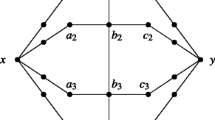Abstract
We study the orthomodular lattices (OMLs) that have an abundance of \(Z_2\)-valued states. We call these OMLs \(Z_2\)-rich. The motivation for the investigation comes from a natural algebraic curiosity that reflects the state of the (orthomodular) art, the consideration also has a certain bearing on the foundation of quantum theories (OMLs are often identified with “quantum logics”) and mathematical logic (\(Z_2\)-states are fundamental in mathematical logic). Before we launch on the subject proper, we observe, for a potential application elsewhere, that there can be a more economic introduction of \(Z_2\)-richness - the \(Z_2\)-richness in the orthocomplemented setup is sufficient to imply orthomodularity. In the further part we review basic examples of OMLs that are \(Z_2\)-rich and that are not. Then we show, as a main result, that the \(Z_2\)-rich OMLs form a large and algebraicly “friendly” class—they form a variety. In the appendix we note that the OMLs that allow for a natural introduction of a symmetric difference provide a source of another type of examples of \(Z_2\)-rich OMLs. We also formulate open questions related to the matter studied.


Similar content being viewed by others
References
Bunce, L., Navara, M., Pták, P., Wright, J.: Quantum logics with Jauch–Piron states. Q. J. Math. (Oxford) 36, 261–271 (1985)
Burris, S., Sankappanavar, H.P.: A Course in Universal Algebra. Springer, New York (1981)
de Lucia, P., Pták, P.: Quantum logics with classically determined states. Colloquium Mathematicae 80(1), 147–154 (1999)
De Simone, A., Navara, M., Pták, P.: States on systems of sets that are closed under symmetric difference. Mathematische Nachrichten 288(17–18), 1995–2000 (2015)
De Simone, A., Pták, P.: Measures on circle coarse-grained systems of sets. Positivity 14, 247–256 (2010)
Dvurečenskij, A.: Gleason’s Theorem and Its Applications. Kluwer Academic Publishers, Dordrecht-Boston-London (1992)
Einstein, A., Podolski, B., Rosen, N.: Can quantum mechanical description of reality be considered complete? Phys. Rev. 47, 777–780 (1935)
Greechie, R.J.: Orthomodular lattices admitting no states. J. Comb. Theory 10, 119–132 (1971)
Gudder, S.P.: Stochastic Methods in Quantum Mechanics. Elsevier, North-Holland, Amsterdam (1979)
Hamhalter, J.: Quantum Measure Theory. Kluwer Academic Publishers, Dordrecht, Boston, London (2003)
Engesser, K., Gabbay, D.M., Lehmann, D.: Handbook of Quantum Logic and Quantum Structures. Elsevier, Amsterdam (2007)
Harding, J., Jager, E., Smith, D.: Group-valued measures on the lattice of closed subspaces of a hilbert space. Int. J. Theor. Phys. 44, 539–548 (2005)
Hroch, M., Pták, P.: States on orthocomplemented difference posets (extensions). Lett. Math. Phys. 106(8), 1131–1137 (2016)
Kalmbach, G.: Orthomodular Lattices. Academic Press, London (1983)
Matoušek, M.: Orthocomplemented lattices with a symmetric difference. Algebra Universalis 60, 185–215 (2009)
Matoušek, M., Pták, P.: Symmetric difference on orthomodular lattices and \(Z_2\)-valued states. Comment. Math. Univ. Carolin. 50(4), 535–547 (2009)
Matoušek, M., Pták, P.: On identities in orthocomplemented difference lattices. Mathematica Slovaca 60(5), 583–590 (2010)
Mayet, R.: Varieties of orthomodular lattices related to states. Algebra Universalis 20, 368–386 (1985)
Navara, M.: An orthomodular lattice admitting no group-valued measure. Proc. Am. Math. Soc. 122, 7–12 (1994)
Navara, M., Pták, P.: For \(n \ge 5\) there is no nontrivial \(Z_2\)-measure on \(L(R^n)\). Int. J. Theor. Phys. 43, 1595–1598 (2004)
Navara, M., Pták, P., Rogalewicz, V.: Enlargements of quantum logics. Pac. J. Math. 135, 361–369 (1988)
Pták, P., Pulmannová, S.: Orthomodular Structures as Quantum Logics. Kluwer Academic Publishers, Dordrecht, Boston, London (1991)
Pták, P., Weber, H.: Relatively additive states on quantum logics. Comment. Math. Univ. Carolin. 46(2), 327–338 (2005)
Pták, P., Weber, H.: Lattice properties of subspace families in an inner product space. Proc. Am. Math. Soc. 129(7), 2111–2117 (2001)
Weber, H.: There are orthomodular lattices without non-trivial group-valued states: a computer-based construction. J. Math. Anal. Appl. 183, 89–94 (1994)
Author information
Authors and Affiliations
Corresponding author
Additional information
Communicated by P. de Lucia.
To Hans Weber with best wishes, and with compliments for his mathematical achievement.
Appendix: The orthomodular lattices with a symmetric difference are \(Z_2\)-rich
Appendix: The orthomodular lattices with a symmetric difference are \(Z_2\)-rich
In this paragraph we briefly (without proofs) indicate the link of \(Z_2\)-rich OMLs with the OMLs that allow for a natural introduction of symmetric difference. The latter class has come into existence independently of \(Z_2\)-RICH and been investigated in [4, 13, 15,16,17]. The definition reads as follows.
Definition 4
Let \(L = (X,\wedge ,\vee ,^\perp ,0,1,\mathbin {\triangle })\), where \((X,\wedge ,\vee ,^\perp ,0,1)\) is an orthomodular lattice and \(\mathbin {\triangle }: X^2 \rightarrow X\) is a binary operation. Then L is said to be an orthocomplemented difference lattice (abbr., an ODL) if the following formulas hold in L:
- \((\mathrm{D}_1)\) :
-
\(x \mathbin {\triangle }(y\mathbin {\triangle }z) = (x \mathbin {\triangle }y)\mathbin {\triangle }z\),
- \((\mathrm{D}_2)\) :
-
\(x \mathbin {\triangle }1 = x^\perp \), \(1 \mathbin {\triangle }x = x^\perp \),
- \((\mathrm{D}_3)\) :
-
\(x \mathbin {\triangle }y \le x \vee y\).
Theorem 2
Each ODL is \(Z_2\)-rich.
The proof of 2 uses a specific ODL reasoning and can be found in [16]. Let us note that the study of ODLs brought about brand new types of \(Z_2\)-rich OMLs. The reader might find them interesting. Also, the investigation advanced to formulating related open question. Let us end up this paper by formulating one of them: Is the variety \(Z_2\)-RICH generated by the class of all ODLs?
Rights and permissions
About this article
Cite this article
Matoušek, M., Pták, P. Orthomodular lattices that are \(Z_2\)-rich. Ricerche mat 67, 321–329 (2018). https://doi.org/10.1007/s11587-018-0378-8
Received:
Revised:
Published:
Issue Date:
DOI: https://doi.org/10.1007/s11587-018-0378-8
Keywords
- Orthocomplemented poset
- Quantum logic
- Projection logic
- Group-valued state
- Symmetric difference
- Boolean algebra
- Variety of algebras



